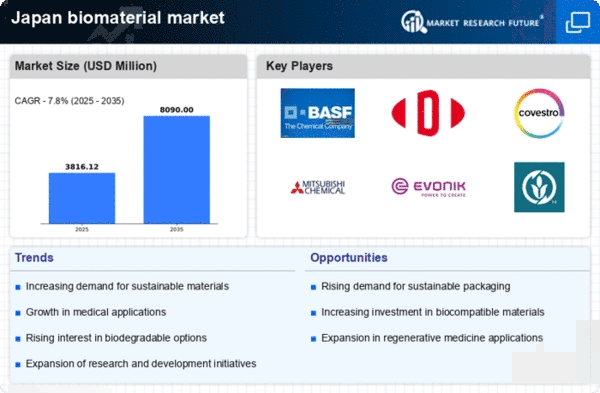Growing Healthcare Applications
The healthcare sector is emerging as a significant driver for the biomaterial market in Japan. With an aging population and increasing healthcare needs, there is a rising demand for innovative medical solutions. Biomaterials are being utilized in various applications, including drug delivery systems, tissue engineering, and surgical implants. The market for biomaterials in healthcare is projected to reach $2 billion by 2025, reflecting a growing recognition of their benefits. This trend is further supported by advancements in medical technology and an increasing focus on personalized medicine. As healthcare providers seek to improve patient outcomes, the biomaterial market is likely to experience substantial growth, driven by the need for safe and effective medical solutions.
Government Support and Regulations
Government policies and regulations significantly influence the biomaterial market in Japan. The Japanese government has implemented various initiatives aimed at promoting the use of biomaterials, particularly in sectors such as packaging and healthcare. For example, the introduction of subsidies for companies developing sustainable materials is likely to encourage innovation and investment in the biomaterial market. Additionally, regulatory frameworks that favor biodegradable and compostable materials are expected to create a conducive environment for market growth. In 2025, it is estimated that government support could lead to a 20% increase in the adoption of biomaterials across various industries. This proactive approach by the government not only fosters a sustainable economy but also enhances the competitiveness of the biomaterial market.
Rising Demand for Eco-Friendly Products
The increasing consumer awareness regarding environmental sustainability is driving the biomaterial market in Japan. As consumers become more conscious of their ecological footprint, there is a notable shift towards eco-friendly products. This trend is reflected in the packaging sector, where biomaterials are increasingly utilized to replace traditional plastics. In 2025, the market for biodegradable packaging in Japan is projected to reach approximately $1.5 billion, indicating a robust growth trajectory. The biomaterial market is likely to benefit from this demand, as companies strive to innovate and offer sustainable alternatives. Furthermore, government initiatives promoting green technologies and materials are expected to bolster this trend, creating a favorable environment for the biomaterial market to thrive.
Increased Collaboration Among Industries
Collaboration between different sectors is becoming increasingly vital for the growth of the biomaterial market in Japan. Partnerships between academia, industry, and government entities are fostering innovation and accelerating the development of new biomaterials. These collaborations often lead to the sharing of knowledge, resources, and technology, which can enhance the overall efficiency of the biomaterial market. In 2025, it is expected that collaborative projects will account for a significant portion of new product developments in the biomaterial sector. This synergy not only promotes the exchange of ideas but also helps in addressing challenges related to scalability and commercialization. As industries work together, the biomaterial market is poised to benefit from enhanced research capabilities and a more robust product pipeline.
Technological Innovations in Biomaterials
Technological advancements play a crucial role in shaping the biomaterial market in Japan. Innovations in material science, such as the development of new biopolymers and composites, are enhancing the performance and applicability of biomaterials across various sectors. For instance, the introduction of advanced bio-based materials in the automotive and construction industries is gaining traction. In 2025, the biomaterial market is anticipated to grow at a CAGR of 12%, driven by these technological breakthroughs. Companies are increasingly investing in research and development to create high-performance biomaterials that meet stringent regulatory standards. This focus on innovation not only enhances product offerings but also positions the biomaterial market as a key player in Japan's transition towards sustainable industrial practices.
















